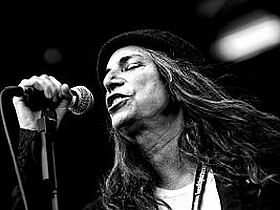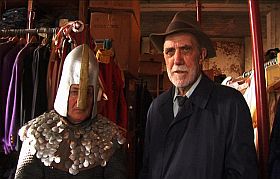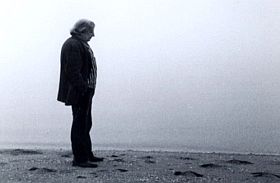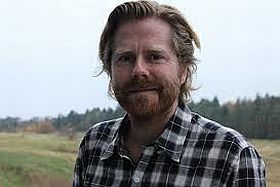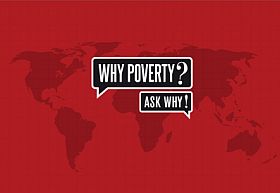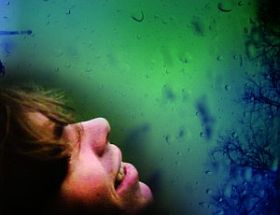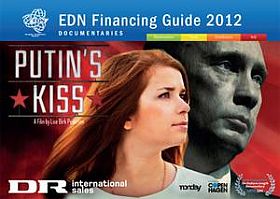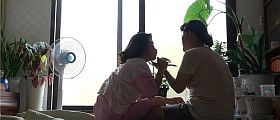Janus Metz and Lars Skree seek and succeed perfectly, from a humanistic point of view, to bring us into a world that we could not imagine existed in the way it is documented and interpreted here. Even the most horrendous words coming out of the mouth of Rasmus, the platoon commander, or from Ølby, the tattooed constantly joking warrior, are put forward with a no-finger-pointing, non-moralisinggentleness… (Tue Steen Müller)
Janus Metz er månedens instruktør i landets nok mindste og måske også mest forvænte filmklub, FILMKLUB FOF i Randers. Det er anledningen til at samle, hvad vi har skrevet om hans film gennem årene og placere dem under overskriften DIRECTORS, som vi lidt efter lidt udbygger med instruktører, hvis film har optaget os og stadig optager os særlig meget.
FRA THAILAND TIL THY / FRA THY TIL THAILAND (2007 / 2008)
af Allan Berg Nielsen
Stedet introduceres i smukt fotografi, Lars Skree og Henrik Bohn Ipsen er fotograferne. Der er myndighed over disse billeder. Et jysk landskab, som er meget, meget mere end et vindblæst hjørne af Danmark. Det er en egn og en befolkning med en særegen livsstil og en stor værdighed og en bevaret integritet, bekræfter fotografiet for mit blik, som er dannet tilbage i romantikken. Og kvinden, det til en begyndelse handler om, introduceres tilsvarende smukt og sikkert. Hun er egentlig fremmed her, men er så integreret, som det har været mulig at blive her, når man ser anderledes ud og er fra den anden side af Jorden. Og så begynder fortællingen, det er som det skal være, jeg er tryg. Fra dokumentarens begyndelse, i del 1, Fra Thailand til Thy. Og jeg skal bestemt nok blive ved den, det mærker jeg fra første begyndelse. For der er jo en ægte historie derfra, en kærlighedshistorie. Som fortsætter og finder sin afslutning i del 2, Fra Thy til Thailand.
1
Kvinden skal formidle et ægteskab. Det har hun gjort før, fundet kvinder hjemme i sin landsby og placeret dem hos mænd her. De holder sammen, og vi lærer to af dem at kende. Hun har nu igen disse tre måneder til det, et turistvisums afmålte tid. Og personen, en søsterdatter, som det nu gælder, ankommer og kastes befippet ud i det. Kontaktannonce, svar, udvælgelse, mødet med manden. Han hedder Kjeld. Han er rar og genert. Hjælperne tager af sted, hun står fortabt i entrédøren til mandens hus, den første virkelig gribende scene. Hvordan skal det gå? Med denne unge kvinde, Kae hedder hun…
Det er godt nok tv-dokumentar, men det ser ikke ud som journalistik. Det er en elementær fortælling, som jeg vil kende fortsættelsen og den foreløbige slutning på. Lykkelig? Men der er en slags pligtstof, noget jeg skal forstå og fortællingen foregår ligesom inde i et socialantropologisk undersøgelse. Men det er et studium af et særligt og varmt miljø og i et storslået landskab. En anden mand valgte sin kæreste på samme måde, og nøgternt fortæller han, det var “ikke kærlighed, men jeg syntes, hun var pæn…” ”Pæn” siger han! Så præcist kan det siges på vores sprog. Det folkelige dansk, som dokumentaren i et særligt sprogplot også skildrer. Egnens dialekt er intakt, og de fremmede kvinder taler den på deres egen tydelige måde, som en understregning af dens egenart.
Hen mod første films slutning forstår jeg, at det på det formelle plan er et etnografisk projekt, et case study. Om det omhyggeligt arrangerede ægteskab. Men fortællingen inden i dette stykke videnskabeligt feltarbejde hentes omhyggeligt frem af klipperen Marion Tour, og den vokser i intensitet i overensstemt takt med følelsernes forvandling hos de to. Det bliver bare smukkere og smukkere. Og selvfølgelig rives jeg med… Titlen på dokumentarfilmen er da også inde i mit hoved Historien om da Kae fik Kjeld…
2
Den histories foreløbige højdepunkt indtræffer med åbningen af film 2 Fra Thy til Thailand. Det sker så filmisk beslutsomt, at afsnittet må finde plads blandt filmhistoriens mange berømte bryllupper, en plads blandt de mærkværdigste. Men smukt er det i sin stiliserede distance og præcise forkortning. Her forener dette afsnits klipper, Marion Tour umærkeligt de to films parallelle ambitioner, socialantropologens og filminstruktørens, den rationelle forklaring og den sentimentale bevægelse. Janus Metz har hele vejen igennem dobbeltprojektet arbejdet sammen med etnografen Sine Plambech, og det er interessant at mærke graden af sammensmeltning af videnskabelig og filmisk metode og evne til forståelse.
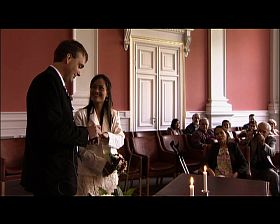
Brylluppet afløses af adskillelse, visumperioden er løbet ud, Kae må rejse. Og jeg fornemmer, at dette ikke vil gå godt. Det fortælles af Kjeld, som i en verbumbøjning i et elegant indklip røber et flash-forward, hvor han vurderer de få dage efter brylluppet som de rigeste i sit liv. Det vil altså snart gå galt, tænker jeg. Scenerne står der stadig, længe, det er mest scenerne, der fortæller, også det, ofte er de uden dialog, tonen er overalt stilfærdig, de indre monologer ligeså.
Men da de alle sammen så med hver deres alvorlige opgave tager ud til Kae i kvindernes fjerne landsby, tager det videnskabelige projekt over. Vi ankommer til landet og til den lille by. Vi er nu på feltarbejde og deltager i en række arrangerede og instruerede samvær, som emne for emne afdækker dette samfunds økonomiske og moralske situation. Og nu kan jeg godt glemme det romantisk dannede blik og det der med kærligheden. Her er det faktualiteterne, det gælder. Lars Skrees fotografiske linje fortsætter imidlertid ubrudt, Marion Tour beretter fortsat i hele scener, og da den nødvendige journalistik må underordnes disse greb (med korte reportage-ekskurser, en til storbyen og barerne og kulturen der og en med en pinagtig forhandling med en barnefader og eksmand, et dramahøjdepunkt..) bliver jeg med voksende uro (hvad med Kae og Kjeld i alle disse sidehistorier?) underlagt klipperytmens ubønhørlige skrue af ro, dens hvilen i scenen til sekundet før den dør, vemodet bag de sjældne smil. (Hvad tænker mon Kjeld på under denne bryllupsrejse?)
Filmene forklarer en mængde forhold, de omhyggeligt skildrede scener viser endnu mere, og neddæmpetheden og rytmens tøven fortæller mig, at filmene godt ved, at vi ikke får alt at vide. Man kan nemlig ikke vide alt. Hvad siges der også i disse kvinders korte sætninger med lange tavsheder, hvad foregår der egentlig bag Kaes bedrøvede blik? Kjeld er ved at finde ud af det… (ABN 05-01-2008)
ARMADILLO (2010)
by Tue Steen Müller
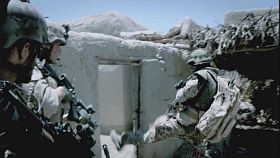
Take a look at the boy. Look at his eyes. See the fear of a soldier. A very young Danish soldier who has just been hit. He serves in Afghanistan, he fights Taliban. He is caught at that very moment of injury in the film of Janus Metz. The cameraman Lars Skree filmed the sequence of the wounded soldier who has his eyes wide open. A sequence where the boy seems about to faint and where you as spectator (at least I did) gets the impression that he is dying. His head falling down as if he is losing consciousness.
He did not die. In the film he returns to the image a couple of times. In a hospital scene where he is happy to meet his pals from the camp, and at the end of the film where he with a big, proud smile shows his family the scar. A memory from Afghanistan.
It is amazing how close the director and his cameraman have come to the characters in the camp in the Helmand province. They have filmed in the camp, in the tanks, on mission, in combat, at debriefing sessions. They have filmed and recorded phone calls to home in Denmark, they have filmed the free time activities from swimming to watching hard core porno films. It is such a rich material they have collected to make this classically built, creative documentary that has all you could ask for in terms of epic quality.
It begins up-front with the boys saying godbye to mum and dad and girl friend. It goes through training sessions before departure, to the meeting with the platoon commander, Rasmus, one of the main characters in the film, who welcomes the new ones by promising them that ”it is going to be interesting”.
And right he is, very much so, and not only for the newcomers but also for the audience. Step by step the filmic narrative brings the informational background to the dramatic situations. The camp as a location is described as well as the technological equipment that is used – surveillance drones that bring back message about where HE is; through the whole film Taliban, the enemy, is called ”him”.
And step by step the action escalates from small, mostly scouting operations to confrontations. With the crucial one placed naturally towards the end of the film: five talibans are being killed, firstly through a hand grenade, secondly by the ”finishing off” of the wounded.
But what is the most astonishing achievement of this film is the way that the films gives space for characters and character development. They are boys, they have chosen to go to Afghanistan, but why? To fight for democracy and for the future of a country, well maybe also that, but first motivation is the longing for company, the seek for a team spirit, and for something to happen in their lives. Excitement, action, fight. Without really knowing what it is to be there. ”You have to be here to understand”, as one of the soldiers say.
I don’t understand the boys, I don’t understand what they are doing there, and the film ”agrees” to a certain degree that the mission is hopeless, for instance through small conversation scenes that take place between the soldiers and the local peasants, who all doubt the success of the foreign soldiers.”Salaam aleikum”, it is said, followed by some general remarks and then nothing else. The contact to the local population is almost not existing. We can’t distinguish between them and the talibans.
I don’t understand them, but I have full sympathy for them, I like them as they are unfolded as characters in the film. Mads is for me the main character, this silent boy, who always sits in the corner listening to the more bragging fellow soldiers. He obeys. I see, and can identify (again a fine edited moment by Per K., the editor, who has done a marvellous job) with his parents standing in the airport looking at their boy leaving… will he come back? The end credits gives the information that he – and several of the others – wants to go back to Afghanistan!
The director does not directly communicate his standpoint, and good for that, we have seen enough films where directors, mostly from a journalistic point, are more than eager to judge and express their opinions. Janus Metz and Lars Skree seek and succeed perfectly, from a humanistic point of view, to bring us into a world that we could not imagine existed in the way it is documented and interpreted here. Even the most horrendous words coming out of the mouth of Rasmus, the platoon commander, or from Ølby, the tattooed constantly joking warrior, are put forward with a no-finger-pointing, non-moralising gentleness, many times in small, well-placed conversation pieces between two soldiers. Example: as Rasmus says on one occasion – ”the worst would be to be all dressed up with no one to blow”. They are literally dressed up in a battle dress or in bathing equipment as were they in a holiday camp for teenagers!
Absurd scenes are often elegantly put in as an invitation to reflection and interpretation. Like the superb one with a couple of the soldiers motorbiking in the courtyard of the base – Werner Herzog could not have done it better. Loneliness it says, or I am bored, give me something to do. Is it far from the scene with the attempts to pick up the corpses from the ditch (”we hit the jackpot in the ditch”!)… or is it not?
Something is rotten… in Denmark and with Denmark, a belligerent nation, a nation at war. (TSM 17-05-2010)
FORBILLEDER
af Allan Berg Nielsen
“Mange har spurgt, hvad vi havde i tankerne, da vi lavede Armadillo. Og en ting, jeg har tænkt meget på, er det med at være isoleret et sted og ikke rigtig vide, hvem der kigger på hvem. Her har Stalker været en stor inspiration. Man er i en zone, hvor der er heftigt omkring en, men alligevel ser man det aldrig, men fornemmer det kun. Det var mange gange den fornemmelse, vi havde, når vi sad i den lille Armadillo-lejr. Det var jo ikke Armadillo, der omringede hele det store område, men området, der omringede os. Og man var hele tiden beluret.” (Lars Skree, fotograf på Armadillo i interview i Politiken, Film, 3. juli 2010)
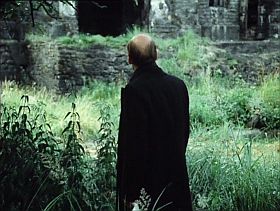
Jeg blev meget optaget af Lars Skrees svar i den lille enquete den dag. Og jeg kom med det samme til at tænke på, at Janus Metz vistnok I Cannes en dag havde sagt, at han opfattede Armadillo som en filosofisk film, og nu så jeg Skree i sin påpegning af konkrete inspirationer holdt sig til de åndelige sider af det filmkunstneriske felt, i sine ambitioner havde han inkluderet poetiske forbilleder. Først nævner han altså Stalker. Og jeg gik til Tarkovskijs poetik og læser igen det Thomas Mann citat fra Der Zauberberg, som Tarkovskij har sat foran sit essay om “det filmiske billede”:
“Wir wollen es so stellen: Ein geistiger, das heisst ein bedeutender Gegenstand ist eben dadurcg ‘bedeutend’, dass er über sich hinausweist, dass er Ausdruck und Exponent eines Geistig-Allgemeinen ist, einer ganzen gefühls- und Gesinnungswelt, welche in ihm ihr mehr oder weniger vollkommenes Sinnbild gefunden hat – wonach sich denn der Grad seiner Bedeutsamkeit bemisst…” (Andrej Takowskij: Die versiegelte Zeit, 1984, tysk oversættelse 2002)
I sin anmeldelse her på Filmkommentaren er Tue Steen Müller på vej mod denne forståelse af “Armadillo”, han tager konkret udgangspunkt i netop et sådant sindbillede: Se på dette billede… Og vi ser, at Skree har filmet denne kriger, som netop for første gang har set, hvad der uden for zonen, set det, som hele tiden har set ham. Tarkovskijs videnskabsmand er rygvendt på vej, Skrees kampvognsfører er filmet en face, vi ser øjnene, som har set “det heftige”.
Om The Three Rooms of Melancholia siger Skree: “Nok en af de mest fantastiske dokumentarfilm, jeg har set. Visuelt er den simpelthen så smuk. Den er næsten to timer lang, og man skal virkelig koncentrere sig. Den er megatung og beskæftiger sig med konsekvenserne af den 2. tjetjenske krig for russiske og tjetjenske børn fra tre forskellige steder. Forældreløse børn hjælpes af det russiske militær, hvis de selv går med i hæren. Måden, den er filmet på, giver den så meget empati, og man får lov til at være fluen på væggen uden at få tingene stoppet ned i halsen”. (Lars Skree, interview i Politiken, Film, 3. juli 2010)
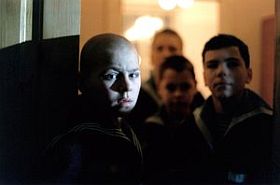
Skree skyr ikke det tanketunge, når det er smukt som Pirjo Honkasalos triptykon Melancholia. Filmen handler om lovens bud du må ikke vidne falsk mod din næste (Honkasalo bruger den engelske formulering: ”Thou shalt not bear false witness against thy neighbour”) og funderer over fjendebilledets opståen. Den er en skønhedsmættet meditation over mennesket fanget i voldelig konflikt uden ende og uden nåde. ”Et rekviem over de levende og de døde” skrev New York Times. Filmens tre afsnit skildrer først livet blandt 9 til 14-årige drenge på det russiske militærakademi på Kronstadt, dernæst i illegale optagelser fra det sønderskudte Grosnij, en kvindes uselviske arbejde med på helt eget initiativ med at redde så mange børn som muligt og endelig blandt børnene i en af Ingusjiens flygtningelejre, hvor Kronstadt-elevernes kommende fjender dannes i deres anderledes kultur med modsatrettede billeder af fjenden. Der fældes ingen domme i dette værk, hændelserne betragtes med opmærksomhed, undren og vemod.
Lars Skree har som mesteren Honkasalo filmet Armadillo simpelthen smukt og med så megen indlevelse, at man er til stede lige bag hans kamera og selv må tage stilling til billedet og det, billedet viser. Man får intet forklaret, intet bliver udlagt.
Waltz with Bashir: “Man kommer ind i universet uden at få en mening stoppet ned i halsen i denne dokumentar. Man får bare lov til at være med og selv bedømme. Og så er der det, at det er en animationsfilm skabt ud fra virkelige optagelser. Animationsformen gør, at man kommer ind i et mere drømmende univers, der ikke bliver så konkret. Den har faktisk samme kvalitet som Stalker, hvor det udefinerbare giver kimen til fantasi. Dokumentarfilm skal ikke nødvendigvis være konkrete, for som filmskabere er vi hele tiden med til at redefinere konventionerne.” (Lars Skree, interview i Politiken, Film, 3. juli 2010)
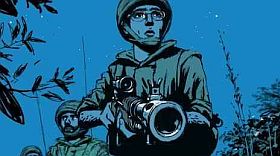
Hvem er denne Bashir? Eller rettere, hvem var han? Har jeg vidst det og glemt det? Filmen handler om at glemme. Historiens fortæller, som også er filmen instruktør, har glemt alt det med denne Bashir og krigen i Libanon i hans ungdom. Hvor han var deltager. Det er mere end 25 år siden.
Bashir Pierre Gemayel (1947-1982) var libanesisisk politiker, militschef og valgt libanesisk præsident i tre uger. Han var ledende medlem af falangistpartiet og præsidentkandidat ved valget i 1982, da landet var midt i den lange borgerkrig (1975-1990) og besat af både syriske og israelske tropper. Bashir Gemayel samarbejdede med israelerne og især med forsvarsministeren Ariel Sharon. Han var stærkt støttet af den amerikanske regering under Ronald Reagan. Hovedmodstanderen var det palæstinensiske PLO, ledet af Yassir Arafat og endvidere de syriske styrker. Bashir Gemayel blev sammen med 26 ledende falangister samlet til møde dræbt ved at attentat 14. september 1982 af en syrisk orienteret maronit kristen. Falangisternes hævn blev den massakre, som Folman havde søgt at glemme. Sammen med de øvrige israelske tropper så han og vennerne passivt til fra deres stillinger et par hundrede meter derfra.
En nat på en bar sidder Ari Folman sammen med en ven fra dengang. Kammeraten fortæller ham om et tilbagevendende mareridt, hvor han jages af 26 bidske hunde. Altid samme antal hunde. De to mænd finder i samtalen frem til, at der er en forbindelse mellem den onde drøm og deres opgave som soldater i den israelske hær dengang under den krig, hvor de rykkede ind i Sydlibanon og stødte helt frem mod Beirut. Kammeratens opgave var faktisk at skyde de hunde, før de ved deres gøen røbede et natligt angreb på landsbyen. Men Folman må erkende, at han faktisk intet husker fra den periode af sit liv. Fortrængningen er manifest.
Han opsøger nu en række af de andre fra hans afdeling dengang, og rekonstruerer begivenhederne, som førte frem til massakren på de mange palæstinensiske flygtninge i Beirutbydelene Sabra og Shatila.
Waltz with Bashir vakte opsigt ved sin fremkomst sidste år, den havde succes på festival efter festival omkring i verden, var Israels bidrag til festivalen i Cannes, og den deltog også i den københavnske og århusianske festivaler. Havde også biografvisninger. Nu kan vi der bor vestligere selv se efter, er Ari Folmans Waltz with Bashir vildt flot, men kold og tom? Som det er hævdet. De fleste kritikere var dog begejstret. Ekstrabladet gav seks stjerner, DR2 Premiere og Politiken hver fem.
Min kollega Tue Steen Müller her på siden gik imidlertid frustreret fra visningen i København. Og har den erfarne mand dårlige fornemmelser med det kunstneriske fintmærkende nærvær under det fremragende håndværk distancering – ja, så er der noget at kigge efter, ved jeg. Og tale om.
Skree og Metzs Armadillo er måske midt i den gruvækkende realitet også et “drømmende univers, som ikke bliver konkret”. Måske har Lars Skree med sine bemærkelsesværdige enquette svar foræret os nøglen til den uforglemmelige og gådefulde film om krigerne i Armadillo.
Og vi vil se på de mulige filmiske forbilleder, fotografens og instruktørens, som så forbavsende udtrykkeligt er offentliggjort, 2 x 3 titler på film. Jeg vil kalde det interessante oplysninger. Lars Skree røbede altså sine i Politiken 3. juli: Tarkovskijs Stalker, Pirjo Honkasalos The three Rooms of Melancholia og Ari Folmans Waltz of Bashir. Janus Metz gav i dagbladet 24Timer den 16. september givet tre bud på en god dokumentarfilm (som jeg tillader mig at opfatte som hans forbilleder sideordnet Skrees tre). Han peger i et lille interview på:
Man on Wire af James Marsh, ”Forrige års oscar-vinder er en enestående og super spændende film om Philippe Petit, der kupper de to Twin Towers for at gå på line mellem dem. Filmen indeholder på mange måder essensen af kunst, da den tilbyder sublime øjeblikke af uforklarlig skønhed, en nærhed til døden og måske endda vanviddet. Og så er man skidegodt underholdt.”
Grizzly Man af Werner Herzog, ”Filmen er et portræt af en mand, der vil være bjørn, og om grænsen mellem kultur og natur. Herzog er en af de få med en god fortællerstemme, der vækker undren frem for at påtvinge tilskueren en konklusion. Han udvider billederne og tilbyder en ny læsning af det, der umiddelbart foregår.”
Nede på jorden af Max Kestner, ”Denne her film fik mig til at ville lave dokumentarfilm. Den handler om en redningsbådsfabrik i Esbjerg, som skal flytte dele af produktionen til Thailand. Filmen indeholder en art poetisk socialrealisme, hvor magiske fiktive greb blander sig med virkeligheden. Det er en enorm smuk og virkelig sjov film, hvor man møder fabriksarbejderne i øjenhøjde.”
Disse tre valg kaster i lighed med Skrees tidligere naturligvis lys over den filmiske baggrund for Armadillo, Metz peger på ”skønhed, dødsnærhed og vanvid” (Man on Wire), ”undren uden konklusion” (Grizzly Man) og ”en art poetisk socialrealisme” (Nede på jorden). Det uddyber, det han mente, da han i Cannes vist nok kaldte filmen et filosofisk værk. Alvorlig meditation og ansvarlig journalistik. (ABN 24-09-10)
ARMADILLO IN CANNES
It is always to be noted that the Cannes Film Festival picks a documentary for a competition screening. This time a Danish one, Armadillo by Janus Metz, has been taken for the Semaine de la Critique. The first screening in Cannes takes place May 16, and the film has a Danish cinema premiere July 8. For that reason we wait with a review till early July but want to tell you what the film is about. Here is the text from the site of the Danish Film Institute:
Armadillo is an upfront account of growing cynicism and adrenaline addiction in young soldiers at war. Mads and Daniel are serving their first mission in Helmand, Afghanistan. Their platoon is stationed in Camp Armadillo, right on the Helmand frontline, fighting tough battles against the Talebans. The soldiers are there to help the Afghans, but as fighting gets tougher and operations increasingly hairy, Mads, Daniel and their friends becomes cynical, widening the gap between themselves and the Afghan civilisation. Mistrust and paranoia set in causing alienation and disillusion.
And about the director Janus Metz: Born 1974, Denmark. MA in Communication and International Development Studies from Roskilde University. Has worked as a researcher on documentary film projects. Metz lived in Johannesburg for one year (2002-03), working on a South African drama series, »Soul City«. The stay inspired him to make his debut film, the documentary »Township Boys« (2006). Also in 2006, he produced the programme »Eventyrerne«/»Clandestine« for the national broadcaster DR, which follows a group of illegal African migrants through Sahara on their way to Europe. »Fra Thailand til Thy«/»Love on Delivery« (2008), recipient of two GuldDok awards at CPH:DOX and selected for IDFA’s Silver Wolf programme, is Metz’ first film about Thai women and their pursuit of a Danish husband. Succeeding this is »Fra Thy til Thailand«/»Ticket to Paradise« (2008), selected for IDFA’s Reflecting Images: Panorama, and honoured with a Special Mention at CPH:DOX. (TSM 12-05-2010 16:00:05)
CANNES
Filmkommentaren is of course following Armadillo’s success in Cannes.
For those who are lucky to be in Paris, Janus Metz’ Armadillo can be seen already the 5th of June (17.30 p.m.) in the special program 49ème Semaine internationale de la critique at the Cinémathèque in Paris, shown together with the short film Berik by Daniel Joseph Borgmann, also in the competition.
Cineuropa wrote: “Janus Metz’s extraordinarily forceful documentary Armadillo stunned the audience in Critics’ Week at the 63rd Cannes Film Festival”.
The Hollywood Reporter: A “Vivid and frightening documentary”, “When the bombs go off and the bullets start flying, Metz and his cameraman provide a real-life vision of what a hurt locker is really all about”.(Sara Thelle 18-05-2010)
GET THE FILM ON SCREEN NOW
Thelle mentions the success of the Danish documentary, Armadillo, that not only filmkommentaren.dk but international press as well characterises as a strong and important work.
The film has for a couple of days hit the headlines in Danish newspapers and Danish politicians have queued to get on national tv to express their opinions about the ”Danish Vietnam” in Afghanistan as one politician expressed it.
Thelle reports that Parisian filmgoers can watch the film in Paris on June 5… the Danish audience has to wait until July 8! I am neither a marketing nor a film distribution expert but use some common sense, please, get the film on screen (and/or television) NOW when everybody talks about it. Right now – in Denmark – the situation is that a debate rolls about a film that very few people have had the chance to watch. So stupid! (TSM 18-05-2010)
PREMIEREN RYKKET
Sund fornuft sejrede: ARMADILLO FÅR PREMIERE DEN 27. MAJ – 6 UGER FØR PLANLAGT. Klip fra pressemeddelelse: Siden den overvældende modtagelse ved verdenspremieren på filmfestivalen i Cannes har Armadillo været omtalt massivt i både danske og internationale medier. Filmen har fået omfattende ros og har sat gang i en ny debat om krigen i Afghanistan, men endnu er det kun danske pressefolk og udvalgte politikere der rent faktisk har set filmen. “Efter den massive mediedækning skylder vi danskerne, at de også selv får mulighed for at tage stilling til filmen – og ikke blot få andres holdning præsenteret gennem medierne. Derfor har vi valgt at sende filmen i biografen så hurtigt som muligt”, udtaler instruktør Janus Metz.
Filmkommentaren.dk, and many others, found it stupid that the film Armadilo was set to premiere by July 8 at a moment where the Danish and foreign media praised the film and debated the Danish involvement in the war in Afghanistan. That has now been changed, of course, so the Danes can see the film. Premiere in a week, May 27. (TSM 20-05-10)
AFP FROM CANNES
The news agency AFP reports tonight from CANNES: A controversial Danish movie set in Afghanistan and a first feature from a Vietnamese director on Thursday scooped awards in Cannes’ Critics Week section…
“Armadillo”, about the growing cynicism and adrenaline addiction of young soldiers in the battlefield, won the top prize for Janus Metz. Shot on the Afghan front, it is the first documentary ever chosen to compete for the Critics’ Week prize. Described as a journey into soldiers’ minds, the movie made wars on the home front this week after showing Danish troops claiming to have “liquidated” Taleban fighters wounded in combat. The army has called for an inquiry after parliamentarians who saw it this week dubbed it “Denmark’s Vietnam.” (TSM 20-05-10)
DEBATSKABENDE OG RØRENDE
The Danish documentary “Armadillo” which premiered in cinemas last friday is a huge audience success. 22.282 tickets have been sold in three days, which is absolutely unusual for a documentary in Danish theatres. Earlier this month “Armadillo” by Janus Metz was awarded the Semaine de la Critique Prize in Cannes.
I weekenden strømmede publikum i stort tal ind i biografens mørke for at se Janus Metzs meget anmelderroste og omtalte film. Alene torsdag, fredag, lørdag og søndag solgte filmen 22.882 billetter og gik direkte ind på førstepladsen på filmhitlisten, hvor den slog Prince of Persia af pinden.
“Jeg tror, Janus Metz har ramt den gyldne mellemvej mellem debatskabende og stærkt rørende film med en masse action og følelser. Det er derfor, den får så stor succes. Men vigtigst af alt skaber filmen en debat hos alle unge som gamle uanset baggrund. Den debat har fra starten været vores drøm, så jeg er rigtigt glad for, at så mange går i biografen og ser den”, udtaler producenten Ronnie Fridthjof. (TSM 01-06-10)
NOTER
Fra Thailand til Thy, Danmark, 2007 og Fra Thy til Thailand, Danmark, 2008. Produktion: Cosmo Doc ved Jesper Jack og Henrik Veileborg.
Armadillo, Denmark, 2010, 100 mins. Director: Janus Metz. Camera Lars Skree. Producer: Ronnie Fridthjof, Sara Stockmann. Edit: Per K. Music: Uno Helmerson. Production: Fridthjof Film Doc.



